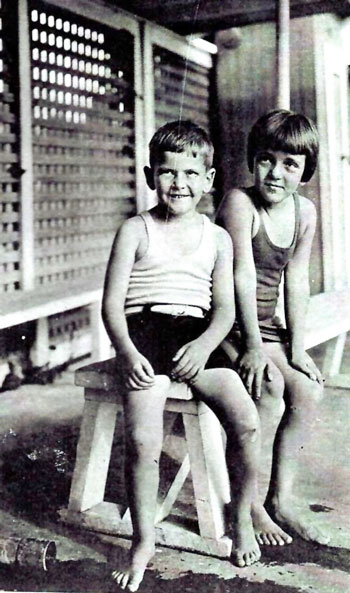A McMillan Family Tradition

1929 – John McMillan’s father, John, left, and his Aunt Margaret poolside in Louisiana, where the family’s interest and knowledge of survival at sea began. Photo courtesy McMillan family.
The importance of offshore survival training has been in the news lately. It has not always been so. Still, John McMillan of Belfast, Maine, is well known to fishermen along the Maine coast as a marine safety trainer for over 20 years.
McMillan teaches offshore survival training in the United States, Europe, Argentina, and Africa. His experience goes back well before he started safety training in Maine.
McMillan’s grandfather was an accountant for a sugar manufacturer in Louisiana. His family lived on the company compound there. The company had a swimming pool on the compound. His grandfather established a swimming team where employees’ children could learn to swim and compete with regional teams. His son, John’s father, and daughter, John’s aunt Margaret, joined that team and swam competitively. Margaret studied physical education in college and went on to teach physical education at the University of Louisiana. In the summer months she continued to teach swim classes.
In the early 1970s there was an accident on an offshore oil rig in the Gulf of Mexico. A scaffold collapsed on the oil rig, workers were thrown overboard and three men drowned. A supervisor at an oil company went to the University of Louisiana to ask if the school had a safety-survival training class. He had been trained in World War II techniques of warfare aquatics. The university referred him to John’s aunt Margaret.
She developed a course and continued to improve it. John trained with his aunt and began working alongside her, teaching the course. Developing the course meant collaborating with others in this new field. The McMillans were pioneers in survival at sea training. In 1980 John and his aunt traveled to Scotland, Norway and Denmark to promote a survival training information exchange program. A year later they went to the U.S. Navy in Pensacola, Florida, to observe the Navy’s underwater escape training. The Navy had built a simulator to train for escaping from a helicopter downed at sea. Top-heavy helicopters flip over in the water, disorienting passengers and complicating escape maneuvers. McMillan said their underwater escape training is based on the Navy’s, but is not as extensive.
Margaret was one of the founding members of the International Association of Survival at Sea Training (IASST) in 1980. The association now collaborates with 48 countries in the development of survival-at-sea strategies. It follows the guidelines set forth by individual country standards. Representatives from IASST countries meet every six months to remain current on each other’s advancements. John McMillan is the U.S. IASST representative. (Reference to MM letter on FV site)
In 1999 the BP oil company went to the Gulf of Mexico and wanted offshore survival training for oil rig employees. At the time survival training was not required.
McMillan first moved to Maine in 1980 and attended his first Fishermen’s Forum when Ed Blackmore was president. He traveled back and forth to Louisiana teaching survival training, until moving to Maine permanently in 1996 where he established McMillan Offshore Survival Training.
McMillan worked with his aunt doing safety compliance work in the Gulf of Mexico. This would lead to him to travel to Nigeria, Chile, Argentina, Equatorial New Guinea and Mexico to teach offshore survival for oil and shipping companies.
McMillan said he didn’t have an exact number, but he thought he has trained more than 50,000 people. “In Nigeria I was training 25 students a day for 28 days in succession, twice a year for 20 years. That alone is about 28,000 students.” Then there are European and African countries, California, Alaska, the Gulf of Mexico, Maine and the Maine Maritime Academy.
McMillan said his family’s background in water safety, survival-at-sea training and his lifelong involvement have made his work with the fishermen of Maine especially important to him. The Gulf of Maine has its own set of survival challenges.
Survival trainers teach from the U.S. Coast Guard guidelines.
McMillan said that even with the proper lifesaving equipment, people must deal with themselves. Too many times, people think it’s a survival situation because they are not familiar with their equipment or surroundings. This is why previous training is important, as it provides a calming mental effect knowing that “I’ve done this before.”
